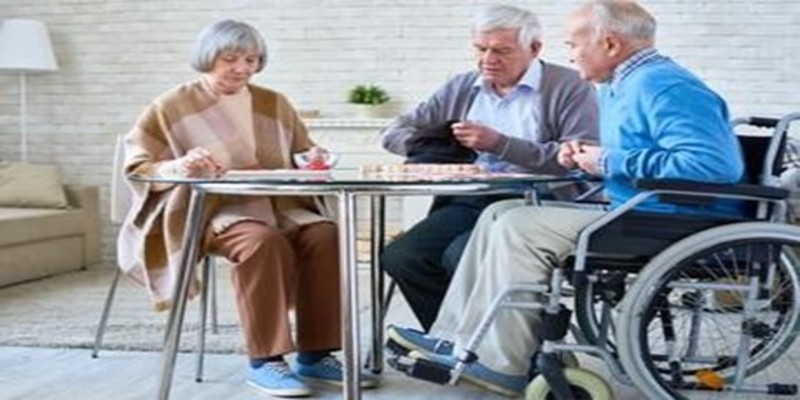5 Signs It’s Time To Consider Senior Living
Is your loved one struggling with everyday tasks? Have you noticed changes in their memory, mobility, or mood? Deciding to move to an assisted living community can feel overwhelming, but ignoring these signs could put their health and safety at risk.
Is your loved one struggling with everyday tasks? Have you noticed changes in their memory, mobility, or mood? Deciding to move to an assisted living community can feel overwhelming, but ignoring these signs could put their health and safety at risk.
Many families wait too long to make the move—often until a fall or medical emergency forces the decision. Recognizing the signs early can make the transition to a supportive senior living community smoother and less stressful for everyone involved.

Difficulty with Daily Activities
If your loved one is facing difficulty performing basic daily functions like dressing, cooking, cleaning, and managing medications, then perhaps the time should be considered when to move to assisted living.
Some warning signs include:
Skipping meals or eating unhealthy foods because cooking is too difficult.
Wearing the same clothes for several days or neglecting personal hygiene.
A messy, cluttered, or dirty home that was once well-kept.
Stacks of unopened mail, unpaid bills, or missed appointments.
This creates a situation for many seniors where what should be a joy is, in fact, a burden. If they cannot manage tasks by themselves anymore, assisted living provides just the right amount of care and autonomy so that they get the support they need while still feeling independent.
Frequent Falls or Unexplained Injuries
The other major sign of needing assisted living assistance is a serious increase in fall and injury risks. Your loved one's continued increase in falls, bruises, or fractures should be red flags pointing toward the need for a more secure living environment.
Some risk factors include:
Difficulty walking or balancing.
Weakness when standing or sitting.
Tripping over furniture or household items.
Struggling to get in and out of bed or a chair.
Falls are a leading cause of injuries among seniors, with one incident setting off a cascade of long-term health problems. Assisted living communities have defined safety features to prevent falls and ensure prompt assistance when required actively. Features like grab bars, non-slip flooring, and a 24/7 emergency response system are all standard in assisted living environments.
Memory Problems and Confusion
Sometimes, forgetting small items is quite normal, but frequent confusion of even the simple kind or even forgetting faces or places may indicate serious cognitive decline affecting your loved one. Memory problems may make a further hazard in independent living if the person has almost any of these attributes:
Forget to turn off the stove or lock doors.
Get lost in familiar places.
Struggle to follow conversations or repeat themselves often.
Misplace important items like keys, medications, or even their phone.
Dementia and Alzheimer's disease can also move rapidly, so early intervention is very important. Different elderly care transition guide advise moving a loved one to a senior living community before memory problems get worse. Many assisted living facilities operate special memory care programs that involve keeping seniors engaged, active, and safe.

Changes in Mood or Behavior
Changes in personality or mood are two of the clearest signs pointing toward the signs it's time to consider senior living. If a loved one always used to be sociable and active and now has become withdrawn, irritable, or depressed, it could indicate loneliness or suffering from deteriorating mental health.
Signs to watch for include:
Avoiding social activities or isolating themselves.
Losing interest in hobbies or things they once enjoyed.
Frequent mood swings, agitation, or unexplained sadness.
Increased anxiety, especially about being alone or handling daily tasks.
This is really bad for a senior, given how isolation can harm their very being. Assisted living communities provide opportunities for their residents to socialize- group activities or dining experiences to keep seniors connected and engaged among themselves.
Poor Hygiene and Health Decline
Neglecting hygiene and health of utmost concern is the second warning sign. Wearing dirty clothes, body odors, and neglecting to brush their teeth means someone is having difficulty taking care of themselves.
Other health-related warning signs include:
Unexplained weight loss or signs of malnutrition.
Missing medication doses or taking the wrong ones.
Signs of dehydration including dry skin and confusion.
Untreated medical conditions or worsening chronic illnesses.
Caregivers at assisted living facilities ensure all seniors get good nutrition, medication management, and assistance with personal care. All of these services help to prevent health complications and improve an individual's lifestyle.
Taking the Next Step
Recognizing signs of the need to go into senior living and all that goes with it is the first step. Then, the next step is to have an honest and open conversation with the partner.
Most seniors resist change because they fear losing their independence. But in truth, assisted living isn't about relinquishing control. It is about having the appropriate assistance for leading a healthier, safer, and more fulfilling life.
If you are seeing these senior living signs, don't wait for a crisis to take action, though. Research options, be early and visit communities. This is the best environment for senior living to enable peace of mind for you and a better quality of life for your loved one.